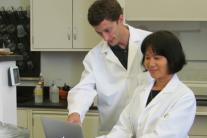UL Lafayette research could yield critical information on global warming
Mon, 05/09/2016 - 10:48amDr. Brian Schubert (assistant professor) and Dr. Ying Cui (postdoctoral researcher) of our School of Geosciences have received a $347,945 three year grant from the National Science Foundation to study the connection between atmospheric carbon dioxide levels and global temperatures. They hope to gain a better understanding of how sensitive Earth's temperature is to changing levels of atmospheric carbon dioxide.
Carbon dioxide is the main greenhouse gas responsible for controlling global temperatures. Our understanding of the link between temperature and carbon dioxide is based only on relatively recent historical data and ice cores dated to less than 1 million years, when carbon dioxide levels were not much different from today. However, a growing body of evidence suggests that Earth has experienced very large fluctuations in both temperature and carbon dioxide. For example, 55 million years ago, parts of the Arctic looked a lot more like southern Louisiana than the tree-less tundra that exists today. However, the amount of carbon dioxide in the atmosphere during this time is poorly understood. Schubert and Cui will use thousands of carbon isotope data records and the known relationship between carbon isotope fractionation and atmospheric carbon dioxide concentration to reconstruct paleo-pCO2 during the Cenozoic. Cui explains that, carbon has two isotopes - carbon 12 and carbon 13 - that are used by plants during photosynthesis and are affected by the amount of carbon dioxide in the atmosphere at the time the plants were growing. When the plants die, this information is preserved in rocks as organic matter. By studying small changes in these two isotopes, we will be able to produce a precise record of how much carbon dioxide levels have changed across the last 65 million years. By comparing these data with existing temperature data, we hope to provide a better understanding of the relationship between temperature and carbon dioxide. This approach will provide important information for understanding how much temperatures will rise in the coming centuries as a result of fossil fuel burning. She also noted that "These data are critical for implementing policies related to climate risk management."
This project will also involve University of Louisiana at Lafayette students, providing them with new tools and original research experiences. Results from this work will be incorporated into course material and help fulfill the School of Geosciences' mission to provide education and research focused on Energy and the Environment.

